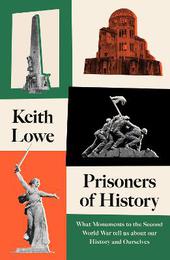
|
Prisoners of History: What Monuments to the Second World War Tell Us About Our History and Ourselves
Hardback
Main Details
| Title |
Prisoners of History: What Monuments to the Second World War Tell Us About Our History and Ourselves
|
| Authors and Contributors |
By (author) Keith Lowe
|
| Physical Properties |
| Format:Hardback | | Pages:320 | | Dimensions(mm): Height 240,Width 159 |
|
| Category/Genre | Historical geography |
|---|
| ISBN/Barcode |
9780008339548
|
| Classifications | Dewey:940.5465 |
|---|
| Audience | |
|---|
|
Publishing Details |
| Publisher |
HarperCollins Publishers
|
| Imprint |
William Collins
|
| Publication Date |
9 July 2020 |
| Publication Country |
United Kingdom
|
Description
A Spectator Book of the Year 2020 A Times and Sunday Times Best Book of 2020 A Mail on Sunday Book of the Year 2020 'Inspired ... Lowe's sensitive, disturbing book should be compulsory reading for both statue builders and statue topplers' MAX HASTINGS, SUNDAY TIMES What happens when our values change, but what we have set in stone does not? Humankind has always had the urge to memorialise, to make physical testaments to the past. There's just one problem: when we carve a statue or put up a monument, it can wind up holding us hostage to bad history. In this extraordinary history book, Keith Lowe uses monuments from around the world to show how different countries have attempted to sculpt their history in the wake of the Second World War, and what these memorials reveal about their politics and national identity today. Amongst many questions, the book asks: What does Germany signal to today's far right by choosing not to disclose the exact resting place of Hitler? How can a bronze statue of a young girl in Seoul cause mass controversy? What is Russia trying to prove and hide, still building victory monuments at a prolific rate for a war now seventy years over? As many around the world are questioning who and what we memorialise, Prisoners of History challenges our idea of national memory, history, and the enormous power of symbols in society today.
Author Biography
Keith Lowe was born in 1970 and studied English Literature at Manchester University. After twelve years as a history publisher, he embarked on a full-time career as a writer and historian, and is now recognised on both sides of the Atlantic as an authority on the Second World War and its aftermath. He is the author of Inferno: The Devastation of Hamburg 1943, and Savage Continent: Europe in the Aftermath of World War II, which won the 2013 PEN/Hessell-Tiltman Prize for History. In 2017 he published The Fear and the Freedom, to great acclaim. His books have been translated into twenty languages.
Reviews'[An] inspired idea ... Always thoughtful and evocative, sometimes controversial ... Lowe's sensitive, disturbing book should be compulsory reading for both statue builders and statue topplers. Too many memorials of all kinds seek to promote deceits or half-truths.' MAX HASTINGS, THE SUNDAY TIMES '[A] brilliantly researched and timely book ... Lowe is not afraid to tread on sensitive ground, but he does so with the integrity that comes from really knowing his material' THE DAILY MAIL, FIVE STARS 'Such a provocative perspective makes Lowe's choice of monuments important. The well-balanced range here enables the retelling of some remarkable war stories, while also providing fascinating insights into the ways different nations have remembered or denied issues around national identity and the glory and horrors of war ... this is some of the most thought-provoking writing about the Second World War that I have read for a long while' SPECTATOR 'In this timely book, which neatly combines history, art criticism and travelogue, Lowe examines 25 monuments to the Second World War spread across three continents ... Lowe is a fine guide to these monuments because he feels the moral force - for good or bad - of each site he visits' THE TIMES, BOOK OF THE WEEK 'Time after time throughout Prisoners of History, Keith Lowe's commentaries are more articulate and supple than the monuments they describe, interpret and criticise' THE LITERARY REVIEW 'Keith Lowe's book could not be more timely ... his observations seem uncannily prescient ... he is sharp on cultural and national differences in perceptions of the war' STANDPOINT MAGAZINE
|